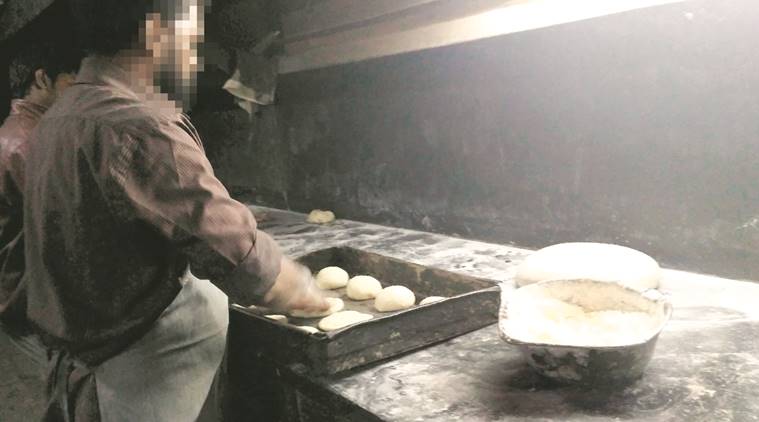- India
- International
The breadwinner: A day in the life of Tabaraq Ansari, 32, cook in a Pune bakery
On the night of December 30 , six people died, locked from outside, in a bakery fire in Pune. Ansari, like those bakery workers, lives and sleeps on the shop premises, wherever he can find space — including on the exhaust hood
 Ansari at work at his bakery near the Pune Railway Station. For three hours a day, he also works at another bakery. Express Photo by Arul Horizon
Ansari at work at his bakery near the Pune Railway Station. For three hours a day, he also works at another bakery. Express Photo by Arul Horizon
He was 11 when he ran away from home in Gorakhpur district of Uttar Pradesh along with his elder brother. The year must have been 1997 or 1998, he doesn’t remember exactly. The siblings came to Pune and found employment at Imperial Bakery — one of the biggest bakers in the city at the time — and started working as helps at a salary of Rs 300 a month.
“It was a novelty for me… this whole bakery business. I had never seen the inside of a bakery before. This one was huge. They used to process 300 gunny bags full of flour everyday. I found to my surprise that I had a talent for baking, for handling the dough. And from the second month itself, my salary increased to Rs 350. The owner, ‘Parsee’, was impressed,” says Tabaraq Ansari, around 32 and a father of four.
Ansari is a ‘khameer baker’ — he makes pav, doughnuts, breads, buns, and toasts. “I don’t know anything about biscuits or cookies. We have another cook for them,” he adds.
Watch What Else Is Making News
As per an estimate of those in the business, Pune and its outskirts have over 1,500 bakeries. Almost all those working as cooks and helpers here are migrants from Uttar Pradesh, Bihar and areas around Delhi. Ansari estimates that he has worked in over a dozen bakeries in Pune since landing here two decades ago.
On December 30, six people suffocated to death at Pune’s Bakes N Cakes bakery in Kondhwa as the two exits were locked from outside. All six, who were in their 20s and all from Uttar Pradesh, were sleeping in the loft. Of them, one was visiting his brother employed at the factory.

Ansari says that almost all bakeries, depending on their size, employ four to eight people who, without exception, stay and sleep on the premises.
While it’s the responsibility of the Labour Commissioner, which grants operating licences to business establishments, to check the working conditions, Ansari can’t recall a single instance when any official — from the Labour or any other department — visited any of the bakeries where he has worked. Even after the Kondhwa incident, no checks have been announced.
The bakery that currently employs Ansari, for Rs 240 per day, is among the busiest in the area if not the biggest. As it’s close to the Pune Railway Station, it’s open for business day and night. The shop is on the ground floor while baking is done on the first floor. The space in the large kitchen is almost completely occupied by stacks of greasy black baking trays, and imposing bakery equipment such as moulders, mixers and ovens.
It’s in between these trays, or on the kitchen platform, even on the exhaust hood, that Ansari and the seven other workers sleep. Those sleeping on the floor use mattresses, others blankets or bedsheets. “We use whatever is provided by the owner,” says a young worker.
As the staff work in shifts, at any given time, half of them sleep as the other half work around them. “Two others and I work from 11 in the night till dawn, and go to sleep around 7 am. Another cook takes over in the morning,” says Ansari.
His day begins around 10.30 am, when he gets up and freshens himself in the dingy toilet on the ground floor that the bakery staff share with workers of a neighbouring hotel, which is also run by the bakery owner. There is no power in the toilet and bathroom block — a kuchcha structure and dark even at noon — and no water. The staff carry water in buckets from outside.
The workers of the hotel sleep not far from the toilet. They don’t mind the darkness, they say; it helps them sleep after their late-night hours.
After freshening up, Ansari and the others who have worked at night head for tea and breakfast to a hawker outside. The lunch and dinner they cook themselves, in the hotel’s kitchen.
Ansari’s first shift lasts from 11 am to 3 pm, when the manager gives him a list of the items that need to be replenished in the shop below, and he starts work on them.
After lunch, around 4 pm, Ansari cleans himself up and steps across the road to another, much smaller, bakery. He works there for the next three hours, earning Rs 150. Given the low wages, he says, he needs every penny.
Ansari says his employer doesn’t object. “Most of us work at other bakeries. The owners don’t say anything as they can silence us whenever we complain with, ‘But we let you work at the other place too’.”
After returning, Ansari has the food, mostly rice and daal, which is cooked by the bakery staff in turns. He lies down now in a corner of the bakery to catch some sleep.
It’s at 11 pm that his main work shift begins. For the next six hours, he makes buns, bread and other products to make sure there is enough “maal (consignment)” for sale till the next evening. He has to meet the demand slip that he got from the manager earlier in the day.
Ansari’s village lies about 50 km north of Gorakhpur. He and his brother, two years older, left home after some trouble in the family, he says. Neither had ever been to a school; with six children, their farm labourer father struggled to keep the family afloat. Few children in the village ever studied, Ansari adds, with most boys just waiting it out till it was time for them to leave for Pune or Mumbai to earn a living like the elders.
By the time Ansari and his brother made their first visit back to the village 17 months after leaving it, Pune was home.
“This is how it is for most of us from UP who work here, be it in the bakery or the catering line,” Ansari says. “If you are unmarried, you visit once in 16-18 months. If you are married, you go once in four months.”
On his second visit home, when he was 16, Ansari got married. He was earning Rs 600 a month at the time. “Humaare yehan shaadi jaldi hoti hai. Tab bhi, aur abhi bhi (Marriages happen early among us. It was the same then, and now),” says Ansari.
His brother worked with him at a bakery for the first two years. “After that, he returned home and sat around doing nothing. Later, he left for Saudi Arabia and started working there,” Ansari says.
The 32-year-old fears there is no future for bakers like him who don’t know modern baking techniques or about the exotic breads and cakes that have captured the market. He also feels bakeries now rely more and more on machines than on men with knowledge.
“I get Rs 240 a day despite my experience. Also, there’s no job security. As long as the owner likes the taste, it’s alright. If I go wrong somewhere, he will sack me, and the next day I’ll be on the road,” he says.
He also complains that the youth now are not willing to learn. “They work for a month, collect their salaries, and the next day, disappear. The manager has to then go hunting for fresh boys,” says Ansari, who has to train the new staff at his bakery.
Ansari often visits his village, where his four children and wife stay with his elder brother’s family. While his eldest child is 16 years old, the youngest is nine. “Whenever I get bored, I go home and stay there as long as I want,” says Ansari.
He is determined though to ensure that all his children study, he says. “I want my daughter and three sons to have a proper education. As a parent, that is my responsibility. Although we can’t control what they will get in life — it’s destiny — it’s our duty to try help them secure a good future.”
His family has never been to Pune, and he has never thought of bringing them here. “It’s beyond my capacity. If I stay alone, I can do some adjustment, live in cheap places, save as much as I can and send home. If I bring them here, I will have to borrow money just to meet the daily needs,” he says.
The December fire that killed six bakery workers doesn’t worry him too much, Ansari adds. It was a one-off incident, and death can catch you anywhere, he shrugs. “That was their fate. If you are destined to die, you can die walking on the road or sitting in an AC office. I haven’t seen many accidents in my 20 years in this business.”
Since their bakery is open round the clock, it is never locked, unlike in the case of the six who died.
Well past midnight, half the bakery staff start preparing to retire for the day. As the trays bang around them, the dough moulders thunder on, the staff still at work shout over the machine hum, and in a corner, a dough lump is slammed against a stone top, the tired workers don’t stir.
No burn marks were found on the six who died in the bakery fire, police found. They suffocated to death, in sleep.
Apr 26: Latest News
- 01
- 02
- 03
- 04
- 05








































